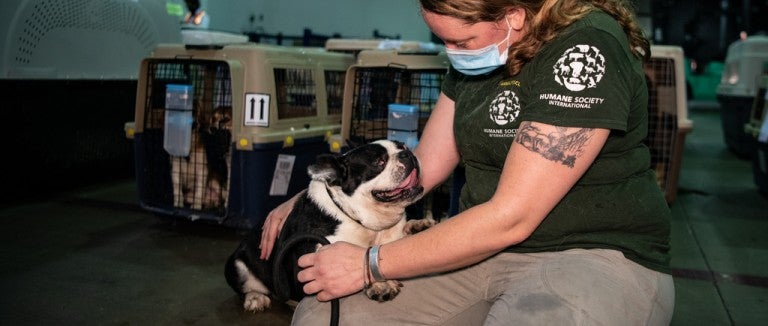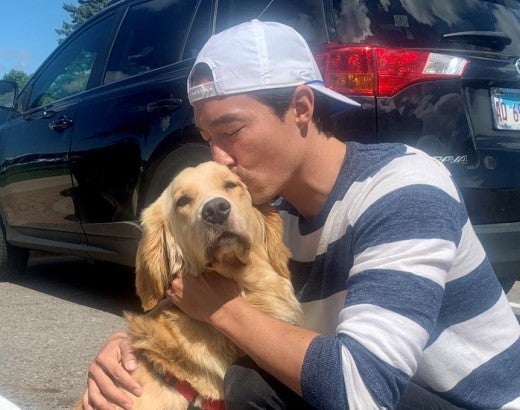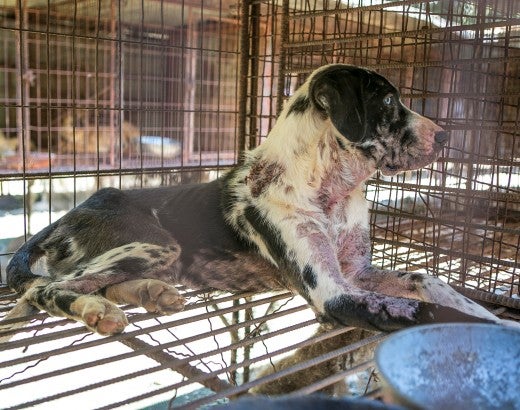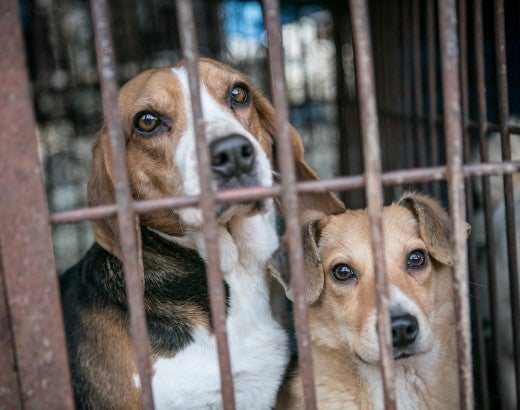When Winkie, a Boston terrier, landed at Dulles airport in Virginia last week, he had a life filled with hope to look forward to: something he’d never had before.
Humane Society International rescuers found Winkie earlier this year on a South Korean dog meat farm. He was living in a small cage with solid sides, barely big enough for him to turn around. He was suffering from extensive injuries to his eyes, and although our veterinarian provided immediate aid, the damage could not be reversed.
This week, Winkie arrived in the United States with 100 other dogs, all of whom have now been transported to our shelter partners, where they await forever homes.
“It was obvious when I saw Winkie on the plane that he was new to navigating his surroundings as a blind dog, but still he showered me with kisses when we arrived in Dulles,” Kelly Donithan, HSI’s senior specialist of disaster operations, told me. “Now that Winkie is with one of our wonderful shelter partners, Animal Haven in New York City, he will get the veterinary care he needs and a home that will help him adapt to life without sight.”
Each of the dogs who arrived with Winkie is just as filled with love and hope as he is. There’s Gelo, a sweet little Jindo mix, who is curious and wags his tail when people greet him, also at Animal Haven. There’s Widget, whom Kelly describes as having “all the Southern hospitality of a wiggly hound” when she first greets people at the Animal Welfare Association shelter in New Jersey where she is awaiting adoption. There’s Toadsworth, or Toadie, a chihuahua who, when our rescuers found him, was cowering in a cage, just feet away from another dead chihuahua who had frozen to death the night before. Kelly—who is fostering him and one more dog from this transport, alongside her six other rescue dogs—says Toadie is sweet and gentle, and loves being petted and giving shy kisses.
Despite the hard lives they’ve led, Winkie, Gelo, Widget and Toadie are the lucky ones. There are an estimated two million dogs languishing on dog meat farms in South Korea. The animals are typically kept in rows of dilapidated cages, surrounded by animal waste, junk and garbage, often without enough food or water, and without adequate shelter in the bitter winters. Their lives end just as terribly, when they’re bludgeoned or electrocuted to death for their meat.
While dog meat is eaten in several countries in Asia, South Korea is the only country that farms dogs for human consumption on a large scale. That’s why we have been working to close these farms, one at a time, and transitioning the farmers to humane and profitable trades. The farmers sign a 20-year contract, stipulating they will not breed dogs or any animals, and the cages are demolished to ensure that no animals will suffer on the property in future. Our goal is to demonstrate to the government that they can adopt this model nationwide, wiping out this industry for good.
At each dog meat farm closure, a veterinarian vaccinates the dogs against the H3N2 (dog flu) virus, rabies, DHPP, canine coronavirus, distemper and parvo. HSI then quarantines the dogs on the farm or at a temporary shelter with no dogs permitted in or out prior to transport overseas. The dogs are given another check-up before their flight to ensure they are healthy enough to fly.
So far, HSI has rescued more than 2,000 dogs from Korean dog meat farms. The dogs are transported to the United States, Canada and the United Kingdom where they go to our partner shelters, which place them for adoption and better lives, far from the hell of life on a dog meat farm.
Since our work in Korea began in 2014, we’ve already seen some pathbreaking successes toward our goal of ending this trade. In November 2018, HSI assisted Seongnam City Council in shutting down the country’s largest dog slaughterhouse there. Two of the nation’s largest dog meat markets have also closed in recent years. And in October 2019, the mayor of Seoul declared his city “dog slaughter free.”
Over the years, we’ve found the farmers we have worked with are also only too eager to give up the trade because they find that with fewer Koreans than ever before eating dog meat, it’s no longer profitable.
But the fight is far from over, as we are reminded right now with the commencement of South Korea’s Bok Nal season, marking the hottest days of summer. Tens of thousands of dogs will be cruelly killed to make "bosintang," a soup commonly eaten during this time of year. That’s why we are asking South Korean President Moon Jae-in to make good on his pledge in 2018 to consider removing dogs from the legal definition of livestock. China recently took a similar step, and there's never been a better time for President Moon to act decisively toward ending a grisly trade that so many South Koreans themselves now view with distaste and disfavor.



